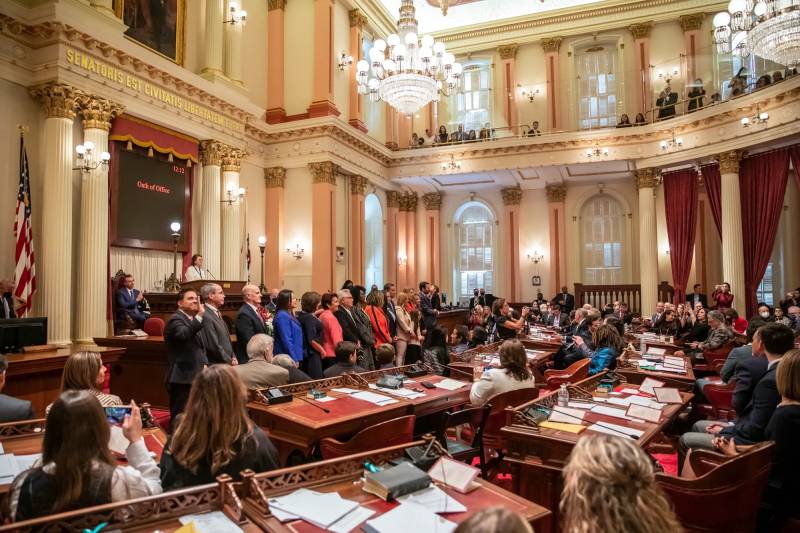The legislation was revived — and highlighted as Assembly Bill 1 on the first day of the current session — by new Assemblymember Tina McKinnor, who leads the committee where it has died four out of the five times it has been proposed.
“What are we afraid of? Why are we afraid of our staff to have representation?” the Inglewood Democrat told CalMatters today. “We’ve asked the farmers to let the farmworkers unionize. We asked the hotel owners to let hotel workers unionize and the restaurant owners to let restaurant folks unionize. And we’re not letting our own folks in our building unionize. We can’t continue this.”
In addition, Assembly Speaker Anthony Rendon supports the idea of staff unionization. The incoming speaker, Assemblymember Robert Rivas, the Hollister Democrat who is set to take the top leadership post on June 30, is one of 20 Assemblymembers and seven senators whose names were on the bill at introduction.
A wave of unionization in Democratic state legislatures across the country, as well as among some U.S. congressional staff, could also help the cause. Oregon became the first state to allow legislative staff to unionize in 2021. Similar efforts were started in Massachusetts, New York and Washington state.
San Diego Democrat Lorena Gonzalez Fletcher — one of the most prominent union champions in the Legislature from 2013 until last year, when she resigned from the Assembly to become head of the California Labor Federation — says there’s no legitimate reason for legislative staff to be blocked from collective bargaining.
“It’s an argument that we hear always in unionizing efforts: Our place of work is special, it’s different, we have unique challenges,” she told CalMatters. “We have unions that are used to dealing with a variety of sticky situations. That’s something that can be worked out.”
At last count, there were more than 1,800 full-time staffers in the state Assembly and Senate, including legislative directors, district coordinators, secretaries and aides.
Dan Schnur, a politics professor at UC Berkeley, University of Southern California and Pepperdine University, says there’s “no coherent argument” to be made for why legislators should not abide by the laws they pass for other Californians. He also argues that “rules for thee” damages civic engagement.
“This is exactly the type of double standard that makes voters across the ideological spectrum absolutely despise politics and politicians,” he said.
Legislative staffers unite
State employees other than legislative staff were granted the right to collective bargaining in the Ralph C. Dills Act, signed into law by then-Gov. Jerry Brown in 1977.
Of the 200,000-plus state workers, more than 80% are represented in one of 21 bargaining units; managers, supervisors and some others are excluded. Last week, for instance, the union representing more than 2,700 state scientists rejected a contract offer from the Newsom administration. The union, which has been without an agreement since July 2020, is seeking 43% raises.
Concerns about past staff unionization bills have included treating the Assembly and Senate as one joint employer although they operate independently, as well as potential timing conflicts between labor contracts and legislative terms.
Other lawmakers have also flagged concerns about outside interests such as unions having a say in the Legislature’s operations, where constituents’ voices are meant to be prioritized above all else.
But staff members say long hours and low pay can also be damaging to democracy.
“People are comfortable trying to exploit our passions for public service,” said Aubrey Rodriguez, a legislative director. “That’s why a union is absolutely needed.”
And McKinnor, the Assemblymember, said that if there were a strike, and managers and supervisors remained on duty, legislators would still be able to vote.
“We can write. We can read. We can do some of our own work,” she said. “Nothing will stop.”
Unionization isn’t the only labor law the Legislature exempts itself from. Lawmakers also aren’t required to pay minimum wage — though many choose to do so — or to pay overtime. And until 2018, legislative staff weren’t included under the Whistleblower Protection Act, which prohibits retaliation against state employees who report misconduct.
The Legislature also wasn’t immune from the #MeToo movement, which raised awareness about rampant sexual harassment and abuse in workplaces. In 2018, leaders released a decade’s worth of records that included 18 cases of alleged sexual harassment and named four lawmakers who were still serving at the time — but only after public pressure and the threat of court intervention.

